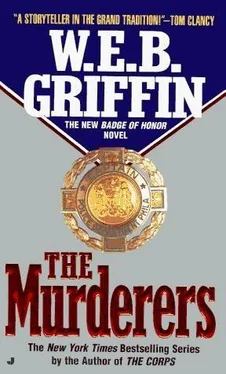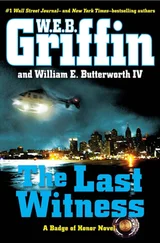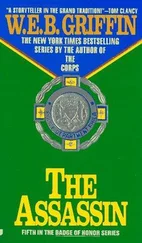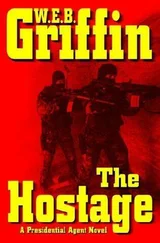W.E.B Griffin - The Murderers
Здесь есть возможность читать онлайн «W.E.B Griffin - The Murderers» весь текст электронной книги совершенно бесплатно (целиком полную версию без сокращений). В некоторых случаях можно слушать аудио, скачать через торрент в формате fb2 и присутствует краткое содержание. Жанр: Криминальный детектив, на английском языке. Описание произведения, (предисловие) а так же отзывы посетителей доступны на портале библиотеки ЛибКат.
- Название:The Murderers
- Автор:
- Жанр:
- Год:неизвестен
- ISBN:нет данных
- Рейтинг книги:3 / 5. Голосов: 1
-
Избранное:Добавить в избранное
- Отзывы:
-
Ваша оценка:
- 60
- 1
- 2
- 3
- 4
- 5
The Murderers: краткое содержание, описание и аннотация
Предлагаем к чтению аннотацию, описание, краткое содержание или предисловие (зависит от того, что написал сам автор книги «The Murderers»). Если вы не нашли необходимую информацию о книге — напишите в комментариях, мы постараемся отыскать её.
The Murderers — читать онлайн бесплатно полную книгу (весь текст) целиком
Ниже представлен текст книги, разбитый по страницам. Система сохранения места последней прочитанной страницы, позволяет с удобством читать онлайн бесплатно книгу «The Murderers», без необходимости каждый раз заново искать на чём Вы остановились. Поставьте закладку, и сможете в любой момент перейти на страницу, на которой закончили чтение.
Интервал:
Закладка:
Washington was aware that his own temper was beginning to flare. He waited a moment.
“Captain, I do what the Boss tells me. He told me to have a long talk with you about the Narcotics Five Squad. That’s what I’m doing.”
“Oh, Christ, Jason, I know that. It just burns me up, is all, that the questions would be asked. I know those guys. I didn’t, I really didn’t, mean to jump on you.”
Washington didn’t reply.
“And I’ll tell you something else, just between us,” Pekach said. “I guess my nose is already a little out of joint. I’m supposed to be the Number Three man in Special Operations, and I don’t like not knowing what you and your people are up to. I know that’s not your doing, but…”
“Just between you and me, Captain Sabara doesn’t know either,” Washington said. “And also, just between you and me, I know that the decision to keep you and Sahara in the dark wasn’t made by Inspector Wohl, and he doesn’t like it any more than you do.”
“I figured it was probably something like that,” Pekach said. “But thank you for telling me.”
Washington shrugged.
“What else can I do for you, Jason?”
“I’m a little afraid to ask.”
“Don’t be.”
“I don’t know the first thing about how the Narcotics Five Squad operates. You do. Would you give some thought to how they could be dirty, and tell me?”
“Jesus Christ!” Pekach said bitterly, and then: “OK, Jason, I will.”
“I’d appreciate it,” Washington said, and stood up.
“Jason, I hope you understand why I’m sore. And that I’m not sore at you.”
“I hope you understand, Captain, that I don’t like asking the questions.”
“Yeah, I do,” Pekach said. “We’re still friends, right? Despite my nasty Polish temper?”
“I really hope you still think of me as a friend,” Washington said.
When Matt Payne went out the rear door into the parking lot, he saw that it was shift-change time. The lot was jammed with antenna-festooned Highway Patrol cars, somewhat less spectacularly marked Anti-Crime Team (ACT) cars, and a row of unmarked cars. Almost all of the cars were new.
There was more than a little resentment throughout the Department about Special Operations’ fleet of new cars. In the districts, radio patrol car odometers were commonly on their second hundred thousand miles, seat cushions sagged, windows were cracked, heaters worked intermittently, and breakdowns of one kind or another were the rule, not the exception.
The general belief held by most District police officers was that Inspector Wohl was the fair-haired boy of the Department, and thus was able to get new cars at the expense of others who did not enjoy his status. Others felt that Special Operations had acquired so many new vehicles because it was the pet of Mayor Carlucci, and was given a more or less blank check on the Department’s assets.
The truth, to which Matt Payne was privy-he had been then Staff Inspector Wohl’s administrative assistant before becoming a detective-had nothing to do with Inspector Wohl or the fact that Special Operations had been dreamed up by the Mayor, but rather with the Congress of the United States.
Doing something about crime-in-the-streets had, about the time the Mayor had come up with his idea for Special Operations, been a popular subject in Congress. It was a legitimate-that is to say, one the voters were getting noisily concerned about-problem, and Congress had reacted in its usual way by throwing the taxpayers’ money at it.
Cash grants were made available to local police departments to experiment with a new concept of law enforcement, This was called the Anti-Crime Team concept, which carried with it the acronym ACT. It meant the flooding of high-crime areas with well-trained policemen, equipped with the very latest equipment and technology, and teamed with special assigned prosecutors within the District Attorney’s Office who would push the arrested quickly through the criminal justice system.
The grants were based on need. Philadelphia qualified on a need basis on two accounts. Crime was indeed a major problem in Philadelphia, and Philadelphia needed help. Equally important, the Hon. Jerry Carlucci was a political force whose influence extended far beyond the Mayor’s office. Two Senators and a dozen or more Congressmen seeking continued employment needed Jerry Carlucci’s influence.
Some of the very first, and most generous, grants were given to the City of Philadelphia. There was a small caveat. Grant money was to be used solely for new, innovative, experimental police operations, not for routine police expenditures. So far as Mayor Carlucci was concerned, the Special Operations Division was new, innovative and experimental. The federal grants could thus legally be, and were, expended on the pay of police officers transferred to Special Operations for duty as Anti-Crime Team police, and for their new and innovative equipment, which of course included new, specially equipped police cars. Since it was, of course, necessary to incorporate the new and innovative ACT personnel and equipment into the old and non-innovative Police Department, federal grant funds could be used for this purpose.
Until investigators from the General Accounting Office had put a stop to it, providing the Highway Patrol, in its new, innovative, and experimental role as a subordinate unit of the new, innovative, and experimental Special Operations Division, with new cars had been, in Mayor Carlucci’s opinion, a justifiable expenditure of federal grant funds.
More senior police officers, lieutenants and above, usually, the “white shirts,” who understood that money was money, and that if extra money from outside bought Special Operations and Highway cars, then the money which would ordinarily have to eventually be spent for that purpose could be spent elsewhere in the Department, were not as resentful. But this rationale was not very satisfying to a cop in a district whose battered radio patrol car wouldn’t start at three o’clock in the morning.
Detective Payne went to a row of eight new, unmarked Ford sedans, which so far as the federal government was concerned were involved in new, innovative, and experimental activities under the ACT concept, and got in one of them. It was one of four such cars assigned to the Investigation Section. Sergeant Jason Washington had one, and Detective Tony Harris the second, on an around the-clock basis. The two other cars were shared by the others of the Investigation Section.
He drove out of the parking lot and headed up Castor Avenue toward Hunting Park Avenue. He turned off Hunting Park Avenue onto Ninth Street and off Ninth Street onto the ramp for the Roosevelt extension of the Schuylkill Express way, and then turned south toward the Schuylkill River.
At the first traffic light, he took one of the two microphones mounted just about out of sight under the dash.
“Mary One, William Fourteen.”
“You have something for me, Fourteen?” Lieutenant Jack Fellows’s voice came back immediately.
“Right.”
“Where are you now?”
“Just left Special Operations.”
There was a moment’s hesitation as Lieutenant Fellows searched his memory for time-and distance.
“Meet us at the Zoo parking lot,” he said.
“On the way,” Matt said, and dropped the microphone onto the seat.
Then he reached down and threw a switch which caused both the brake lights and the blue and white lights concealed behind the grille of the Ford to flash, and stepped hard on the accelerator.
The Mayor is a busy man. He doesn’t have the time to waste sitting at the Zoo parking lot waiting for a lowly detective. This situation clearly complies with the provisions of paragraph whatever the hell it is of Police Administrative Regulations restricting the use of warning lights and sirens to those clearly necessary situations.
Читать дальшеИнтервал:
Закладка:
Похожие книги на «The Murderers»
Представляем Вашему вниманию похожие книги на «The Murderers» списком для выбора. Мы отобрали схожую по названию и смыслу литературу в надежде предоставить читателям больше вариантов отыскать новые, интересные, ещё непрочитанные произведения.
Обсуждение, отзывы о книге «The Murderers» и просто собственные мнения читателей. Оставьте ваши комментарии, напишите, что Вы думаете о произведении, его смысле или главных героях. Укажите что конкретно понравилось, а что нет, и почему Вы так считаете.











